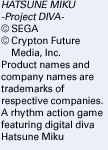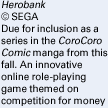- HOME>
- PRESENT Turning Ideas into Entertainment Value
We use creators' ideas to make the products we bring to the world. It is only at this point that ideas generate value. The SEGA SAMMY Group's operating companies have businesses in a wide range of entertainment areas. We continuously improve business models throughout the operations of these companies—from development and production through sales—so that we can keep on delivering competitive entertainment.
As the core operating company of the Pachislot and Pachinko Machine Business segment, Sammy is reengineering its business models to realize rigorously market-driven operations. These efforts cover all aspects of operations, from a product development system that unites development, sales, and production through to an industry-leading production system that reduces lead times dramatically and enables Sammy to meet intensive demand concentrated in short periods.
Sammy has competitive intellectual properties that it has developed in-house, including the Aladdin series and the Juoh series. Also, the company actively incorporates major intellectual properties from outside, such as the Hokuto No Ken series and the SOUTEN-NO-KEN series. Sammy creates competitive products by optimally combining intellectual properties and its original mechanical engineering capabilities. Furthermore, we protect our intellectual properties to secure the advantages of these operations while rigorously avoiding infringing upon third parties' intellectual properties.
![]()


![]()



![]()
Our market research division collects utilization rate data to determine which types of machines are earning market support. Based on this information, development, sales, and production divisions work together closely to advance an integrated series of processes that includes preparing development schedules and managing progress, analyzing and deciding development costs, checking quality, checking mass production compatibility and durability, forecasting unit sales, and deciding sales prices. Furthermore, we use a "gate management" system that entails strict checks at three stages, or gates, during the development process. At each of these gates, we also check for any changes in the market environment, which can occur during products' development periods, and flexibly adjust plans if needed. This system is steadily enhancing the product appeal of our pachislot and pachinko machines.
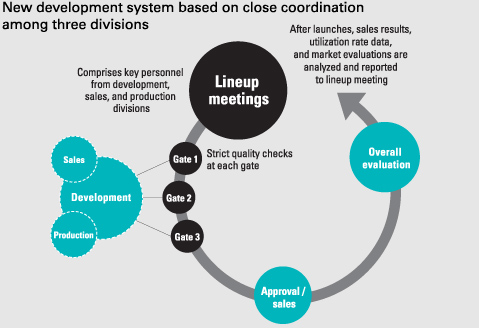

![]()
We boast one of the industry's largest production capacities. The new plant, which started up operations in September 2012; the older plant; and Group companies' plants give us a combined daily production capacity of 7,900 pachislot machines and 9,800 pachinko machines. Moreover, we are shortening production lead times by simplifying production processes through the outsourcing of certain processes.
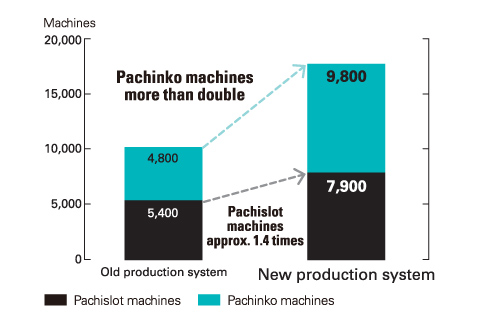

![]()
Next to the new plant, we have built a new distribution center that consolidates the capabilities of what was our largest distribution center and component warehouses that were at six different locations. The new distribution center incorporates an upgraded system for controlling warehousing, shipping, and delivery operations that reduces man-hours and realizes real-time inventory recording.
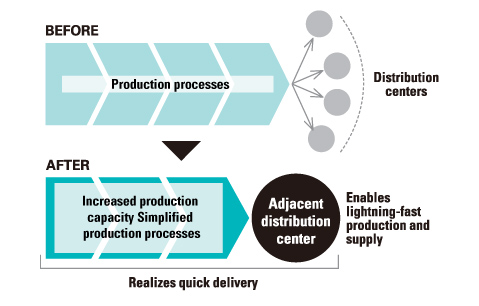

![]()
By coordinating our new distribution center with our new plant, which has industry-leading production capacity and shorter production lead times, we can cater to the intense demand for pachislot and pachinko machines that tends to occur in the initial period after sales launches. In other words, we have established a system that minimizes sales opportunity loss.

![]()
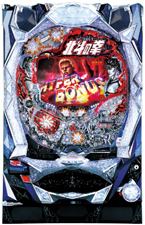
- Pachinko CR Hokuto No Ken 5 Hasha
© Buronson & Tetsuo Hara / NSP1983,
Approved No. YKA-105© Sammy
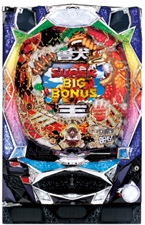
- Pachinko CR Shin-Juoh
© Sammy

![]()
Owning competitive intellectual properties at home and abroad, SEGA fosters intellectual properties and maintains and enhances their value by increasing points of contact with players. At the same time, it creates new intellectual properties tirelessly.
![]()
![]()
![]()
FOOTBALL MANAGER
© Sports Interactive Limited 2012. Published by SEGA Publishing Europe Limited. Developed by Sports Interactive Limited. SEGA and SEGA logo are either registered trademarks or trademarks of SEGA Corporation. Football Manager, Sports Interactive and the Sports Interactive Logos are either registered trademarks or trademarks of Sports Interactive Limited.
TOTAL WAR
© SEGA. THE CREATIVE ASSEMBLY AND THE TOTAL WAR LOGO ARE TRADEMARKS OR REGISTERED TRADEMARKS OF THE CREATIVE ASSEMBLY LIMITED. SEGA AND THE SEGA LOGO ARE EITHER REGISTERED TRADEMARKS OR REGISTERED TRADEMARKS OF SEGA CORPORATION. ALL RIGHTS RESERVED. ALL OTHER TRADEMARKS ARE THE PROPERTY OF THEIR RESPECTIVE OWNERS.
Company of Heroes
© SEGA. Developed by Relic Entertainment Inc. SEGA, the SEGA logo, Relic Entertainment and Company of Heroes are either registered trademarks or trademarks of SEGA Corporation. All rights reserved. All other trademarks, logos and copyrights are property of their respective owners.
ALIENS
Aliens: Colonial Marines, Alien, Aliens, Alien 3™ & © 2013 Twentieth Century Fox Film Corporation. All rights reserved. Twentieth Century Fox, Alien, Aliens, Alien 3 and their associated logos are registered trademarks or trademarks of Twentieth Century Fox film Corporation. Aliens: Colonial Marines game software, excluding Twentieth Century Fox elements © SEGA. SEGA and the SEGA logo are either registered trademarks or trademarks of SEGA Corporation. All rights reserved. © 2013 Gearbox Software, LLC. Gearbox and the Gearbox Software logos are registered trademarks of Gearbox Software, LLC in the U.S. and/or other countries and used here under license.
![]()
Owning competitive intellectual properties at home and abroad, SEGA fosters intellectual properties and maintains and enhances their value by increasing points of contact with players. At the same time, it creates new intellectual properties tirelessly.
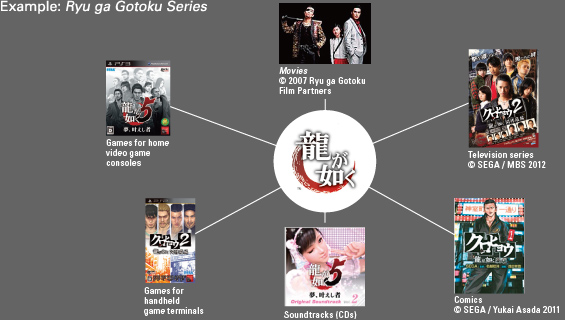
![]()
In the 1970s, SEGA launched the first video game made in Japan. Since then, it has remained at the forefront of the industry's development by offering an array of mold-breaking games as an amusement arcade machine pioneer. Today, it is showing further leadership in the industry by introducing new business models that are helping invigorate the amusement industry.
![]()
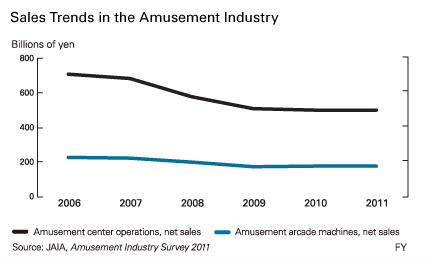
The amusement arcade machine market has continued to see challenging conditions due to the shrinking of the amusement center operations market. To stimulate the amusement center operations market and sustain growth of amusement arcade machine sales over the long term, SEGA is actively introducing business models based on two main approaches.
![]()
We are proactively advancing products and business models that help invigorate the industry by lessening amusement center operators' capital investment burden and thereby encouraging the introduction of new products.
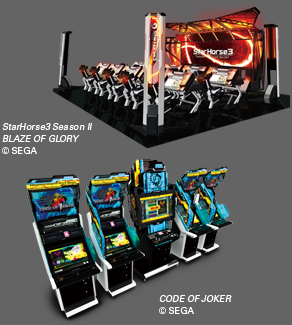
CVT Kits We are introducing CVT kits, which enable amusement center operators to upgrade games without purchasing new machine cabinets. Operators use the kits to replace the boards, oftware, and exteriors of their existing machines.
Revenue-Sharing Business Model SEGA is promoting the introduction of a revenuesharing business model. In this model, SEGA provides amusement center operators with low-priced machine cabinets and free content. Through the infrastructure of SEGA's ALL.NET network service, the company and amusement center operators share revenues from the utilization of the amusement arcade machines. Under this model, amusement center operators are able to curb their initial investment while introducing new products. Meanwhile, the business model extends SEGA's involvement beyond the sales of amusement arcade machines. It allows us to sustain earnings by upgrading content periodically and thereby maintain the market value of our amusement arcade machines.
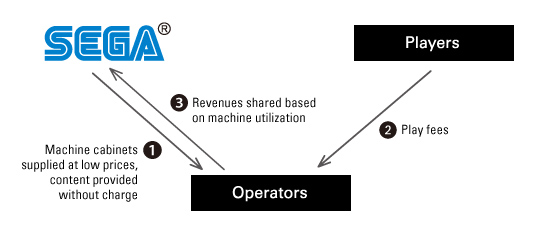
![]()
We are developing products and business models designed to extend our player base beyond core players to encompass families.
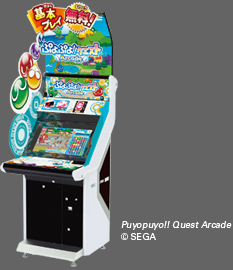
Free-to-PlayThrough Puyopuyo!! Quest Arcade, SEGA is advancing the amusement arcade machine industry's first business model based on free-to-play (F2P) games. These games can be played for free, but players pay fees to purchase items within the games or to continue stages. By using the broadly popular Puyo Puyo!! intellectual property for this new game format, we hope to attract women and families, who tend visit amusement centers less frequently. In the future, we hope to further exploit amusement centers and digital content so that they grow each other's customer bases.
![]()









